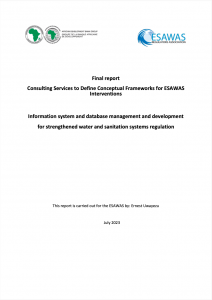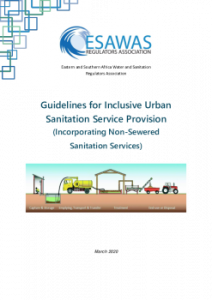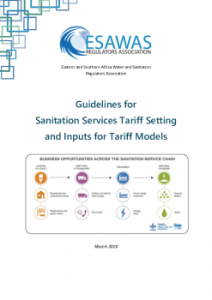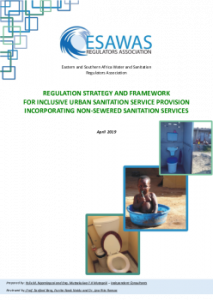REGULATORY GUIDANCE
LIBRARY
Regulatory Guidance

Regulatory Guidance
GIS Guidance for WSS Services
Information system and database management and development for strengthened water and sanitation systems regulation. This report is the compilation of the results on the study for setting up an GIS based as a decision support tool for performance monitoring, planning, and resource allocation, utilities management, with the aim to enhance WSS services delivery within the ESAWAS members’ countries, especially in urban areas.

Regulatory Guidance
Guidelines for Inclusive Urban Sanitation Service Provision
To provide guidance on service provision requirements from containment, emptying, transportation, storage and treatment facilities as well as disposal/reuse mechanisms. The guidelines promote safe and sustainable service delivery with consideration for technology, cost-effectiveness, appropriateness and progressive realisation.

Regulatory Guidance
Guidelines for Sanitation Services Tariff Setting
To provide a guidance to regulators in the determination of cost reflective tariffs for sewered and non-sewered services in line with the tariff setting principles. The guidelines provide a set of sound, well-specified methodology that can be used by regulators to improve predictability, objectivity and transparency of the tariff-setting for sanitation services, as well as inputs for development of tariff setting models.

Regulatory Guidance
Guidelines for Citywide Inclusive Sanitation (CWIS) Planning
To provide guidance for citywide inclusive sanitation planning that encompasses long-term planning, technical innovation and financial mobilisation. Includes Business Models, Business Planning, Investment planning, Financing options, Private Sector Participation, appropriate technology, stakeholder engagement, gender and social inclusion considerations and planning tools.

Regulatory Guidance
Regulation Framework and Strategy for Inclusive Urban Sanitation Service Provision
Outlines a regulatory framework and strategy that integrates and addresses inclusive urban sanitation service provision (incorporating non-sewered sanitation) such that the WSS regulator can effectively administer its mandate.